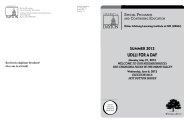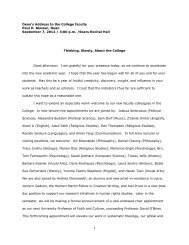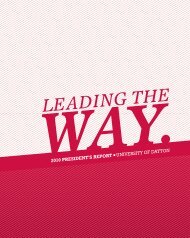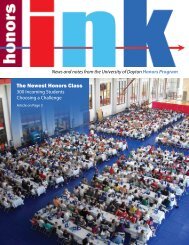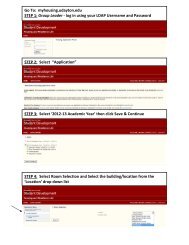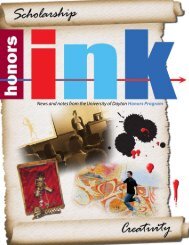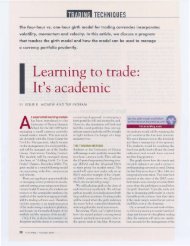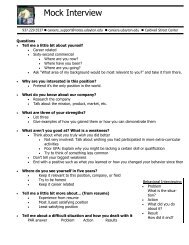Stander Symposium abstract book - University of Dayton
Stander Symposium abstract book - University of Dayton
Stander Symposium abstract book - University of Dayton
You also want an ePaper? Increase the reach of your titles
YUMPU automatically turns print PDFs into web optimized ePapers that Google loves.
9:00 AM to 10:30 AM<br />
narrows when using the cellular phone. Further, it has been shown that drivers experience the same degree <strong>of</strong> impairment whether using handheld<br />
or hands-free devices. As such, prevention efforts to reduce the risks <strong>of</strong> motor vehicle collisions are greatly urged. This study aims to explore,<br />
based on the Theory <strong>of</strong> Planned Behavior, which is the strongest predictor <strong>of</strong> cellular phone driving in a population <strong>of</strong> parents.<br />
Privacy in Public: Personality and Eriksonian Theory as Applied to College Students’<br />
Face<strong>book</strong> Disclosure<br />
Presenter(s): Claudia E Clark<br />
Advisor(s): Melissa J Layman-Guadalupe, Carolyn R Phelps<br />
Psychology - Honors Thesis<br />
In recent years, Face<strong>book</strong> has become an internet phenomenon. This has resulted in widespread use and various levels <strong>of</strong> disclosure. Previous<br />
research has found that personality affects the amount and types <strong>of</strong> disclosure on users’ pr<strong>of</strong>iles, especially the traits <strong>of</strong> extroversion (a continuum<br />
<strong>of</strong> energy from others or energy from self) and neuroticism (a continuum <strong>of</strong> anxiety and control-orientation vs. calmness and less emphasis on<br />
control). Although research is fairly extensive on these traits and their effects on Face<strong>book</strong>, it is conflicting. In addition, Erikson’s theory <strong>of</strong> psychosocial<br />
development states that a person reaches specific life crises at different stages and must solve these in order to live successfully. Studies have<br />
found that level <strong>of</strong> psychosocial development affects disclosure on one’s Face<strong>book</strong> pr<strong>of</strong>ile, but this research is scarce. This study will focus on the<br />
crises <strong>of</strong> “Âidentity vs. role confusion,” in which a person must understand himself, and “intimacy vs. isolation,” in which a person connects with or<br />
retracts from others. This thesis aims to find how the factors <strong>of</strong> personality and development specifically affect disclosure on Face<strong>book</strong> pr<strong>of</strong>iles <strong>of</strong><br />
undergraduate college students. Participants were students enrolled in a psychology course. They took a questionnaire regarding Face<strong>book</strong> use,<br />
and they also filled out four validated surveys, each measuring one <strong>of</strong> the four factors <strong>of</strong> focus in this study: extroversion, neuroticism, identity, and<br />
intimacy. The results <strong>of</strong> these surveys will be compared to the “information” section, last “status update,” and pr<strong>of</strong>ile picture <strong>of</strong> each participant. I<br />
believe that this study is important in understanding this age group and by creating a better awareness <strong>of</strong> self in order to exercise greater caution<br />
when posting information on Face<strong>book</strong>.<br />
Recovery from Mental Illness: Further Development <strong>of</strong> a Measure <strong>of</strong> Recovery Constructs<br />
Presenter(s): Jonathan Hentz<br />
Advisor(s): Roger N Reeb<br />
Psychology - Graduate Research<br />
The primary objective <strong>of</strong> this study is to develop a theory-driven, empirically-based, brief psychometric instrument to assess recovery from mental<br />
illness. Participants will include approximately 100 adult clients from a local community mental health agency at various levels <strong>of</strong> recovery from<br />
mental illness. Clients will be asked to complete several self-report instruments which have been slightly revised to allow consistent formatting<br />
between instruments. Based on the results <strong>of</strong> a preliminary study (Hintze, 2009), twenty-one <strong>of</strong> the most representative items from instruments<br />
measuring the following constructs were selected to constitute the recovery psychometric battery: hope, purpose or meaning in life, coping<br />
self-efficacy, empowerment, and self-esteem. In addition, participants will complete the following psychosocial criterion measures that assess<br />
real-life functioning: A well-validated, brief measure <strong>of</strong> recovery will help mental health pr<strong>of</strong>essionals to (a) quickly assess and understand the<br />
clientâs level <strong>of</strong> progress in recovery and (b) identify specific factors (i.e., hope, purpose in life, or agentic control) that need to be targeted in order<br />
to augment and promote recovery.<br />
The Effect <strong>of</strong> Context Upon the Perception <strong>of</strong> Egocentric Distance Using a Walkable Human<br />
Muller-Lyer Illusion<br />
Presenter(s): Natalie L Anderson, Adam Barnas, Ryan N Fuentes, Kevin Longacre, Natalya N Lynn, Katherine<br />
Y Peters, Nicole A Schlater, Jeremy T Schwob, Adam D Sitz<br />
Advisor(s): Benjamin R Kunz<br />
Psychology - Independent Research<br />
The Muller-Lyer illusion is a well-known geometric illusion in which pairs <strong>of</strong> lines <strong>of</strong> the same length are perceived to be different because <strong>of</strong> forms<br />
(e.g. “fins”) at the ends <strong>of</strong> the lines. This influence <strong>of</strong> context upon the perception <strong>of</strong> line length is well-established for 2-D illusions but has also<br />
been demonstrated in larger-scale, three-dimensional spatial tasks (Wraga, Creem and Pr<strong>of</strong>fitt, 2000). Across three experiments, we utilized a<br />
48




